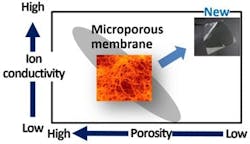Toray Industries' New Polymer Membrane Aimed at Boosting Vehicle Ranges
Toray Industries Inc. said March 10 that it has developed an ion-conductive polymer membrane that solves a key capacity issue in batteries.
The development delivers 10 times the ion conductivity of alternative methods, according to the company.
Battery developers have been looking for ways to design lithium-ion batteries that deliver higher energy densities.
But during charging and decharging cycles, lithium metal can lead to the growth of branch-like crystals called lithium dendrites. Dendrite growth can degrade battery performance and cause short circuits.
Metallic lithium anodes employing solid electrolytes pose similar hurdles, according to Toray.
The company said it found a solution to these problems using polymer membranes that provide ion conductivity through a process called hopping conduction.
“This mechanism enables lithium ions to move between interacting sites within nonporous polymer membranes,” the company said in a news release.
The polymer film functions as a protective layer on lithium metal surfaces to overcome the conductivity issues and should extend the service lives of batteries using lithium metal lithium anodes, Toray said.
This new offering could accelerate the deployment of solid-state batteries, air batteries and lithium-metal batteries, the company said.
About the Author
Jonathan Katz
Executive Editor
Jonathan Katz, executive editor, brings nearly two decades of experience as a B2B journalist to Chemical Processing magazine. He has expertise on a wide range of industrial topics. Jon previously served as the managing editor for IndustryWeek magazine and, most recently, as a freelance writer specializing in content marketing for the manufacturing sector.
His knowledge areas include industrial safety, environmental compliance/sustainability, lean manufacturing/continuous improvement, Industry 4.0/automation and many other topics of interest to the Chemical Processing audience.
When he’s not working, Jon enjoys fishing, hiking and music, including a small but growing vinyl collection.
Jon resides in the Cleveland, Ohio, area.


